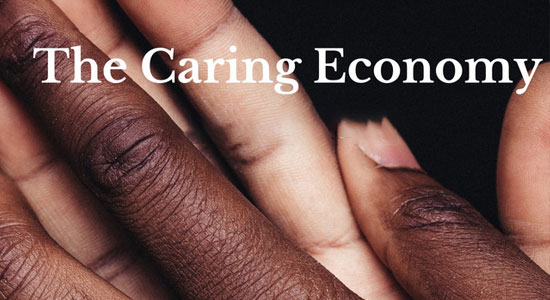 February marks Black History Month in the United States, a time to honor the struggles, achievements, and enduring contributions of African Americans to the nation’s social, cultural, and economic fabric. We have celebrated many of these contributors since the launch of The Caring Economy nearly four years ago. From Ford Foundation President Darren Walker to P&G Chief Communications Officer Damon Jones, to billionaire entrepreneur Sheila Johnson and Spectrum NY1 anchor Cheryl Wills. Along the way we have noted that while acknowledging the past is crucial, Black History Month has also evolved into a platform for examining the present and envisioning a more equitable future. In this context, the role of Corporate Social Responsibility (CSR) is increasingly scrutinized and reshaped.
February marks Black History Month in the United States, a time to honor the struggles, achievements, and enduring contributions of African Americans to the nation’s social, cultural, and economic fabric. We have celebrated many of these contributors since the launch of The Caring Economy nearly four years ago. From Ford Foundation President Darren Walker to P&G Chief Communications Officer Damon Jones, to billionaire entrepreneur Sheila Johnson and Spectrum NY1 anchor Cheryl Wills. Along the way we have noted that while acknowledging the past is crucial, Black History Month has also evolved into a platform for examining the present and envisioning a more equitable future. In this context, the role of Corporate Social Responsibility (CSR) is increasingly scrutinized and reshaped.
From Recognition to Action
Beyond celebratory events and educational initiatives, corporations are now expected to demonstrate genuine commitment to racial justice and inclusion. This translates into actions that go beyond performative gestures and address systemic issues impacting Black communities.
Key areas of focus include:
Consumers and stakeholders are increasingly demanding transparency and accountability from corporations regarding their CSR efforts. Simply boasting about donations or diversity statistics falls short. Companies need to:
Beyond February
The true measure of a corporation’s commitment to racial equity lies in its actions beyond Black History Month. By integrating these principles into their core values and business practices, companies can play a meaningful role in building a more just and inclusive society.
This year’s theme, “African Americans and the Arts,” highlights the profound contributions of Black artists across various mediums. It serves as a powerful reminder that Black history is not merely a matter of the past, but a vibrant and ongoing force shaping the present and future.
Beyond US Borders: Recognizing Black Leaders Shaping the World in 2024
February might mark Black History Month in the United States, but the impact of Black leaders extends far beyond national borders. Across the globe, individuals of African descent are driving change, fostering innovation, and making their mark on diverse fields. This month, let’s celebrate some of these exemplary figures who inspire us all:
Politics and Activism:
Business and Technology:
Arts and Culture:
Science and Innovation:
Why Black History Month Matters More Than Ever for Young People
For many young people, it might seem like Black History month is full of historical figures and dates to memorize. But beyond the surface level, Black History Month holds immense significance for young people today, shaping their identities, fostering understanding, and igniting a passion for change.
Young people, especially those of African descent, are bombarded with limited narratives about their heritage. Black History Month shines a light on a diverse tapestry of heroes, innovators, and everyday people who defied adversity and made history. From scientists like Katherine Johnson to activists like Malala Yousafzai, young people encounter role models who shatter stereotypes and inspire them to dream big. This month allows them to connect with their roots, discover hidden figures, and see themselves reflected in stories of resilience and triumph.
Black history isn’t just about the past; it’s the living foundation of the present and a crucial lens for understanding the world around us. By learning about historical struggles like slavery, segregation, and the Civil Rights Movement, young people gain context for ongoing issues like racial injustice and systemic inequality. This knowledge empowers them to critically analyze the world, challenge biases, and advocate for a more equitable future.
Black History Month isn’t just for Black people. It’s an opportunity for everyone to step outside their comfort zones and learn about different experiences. This shared learning fosters empathy, understanding, and a sense of shared humanity. Young people can engage in open dialogues, explore diverse perspectives, and challenge their own biases. This builds bridges across racial divides and fosters a more inclusive and just society.
More than just passive learning, Black History Month can be a springboard for action. Young people can be empowered to become agents of change. They can participate in discussions, volunteer in their communities, or even start their own initiatives to address issues they care about. This month can spark a lifelong commitment to social justice and inspire them to create a more equitable world for all.
Black History Month is more than just a month on the calendar. It’s a chance for young people to connect with their past, understand the present, and shape a more just future. Let’s use this opportunity to celebrate the rich tapestry of Black history, nurture empathy and understanding, and empower young people to become the changemakers of tomorrow.
The leaders cited here reflect a commitment to education, service, and inclusion. Through their work, they continue to drive initiatives that contribute to betterment of society globally. As with all purpose-driven guests on The Caring Economy,we can learn much from the interviews with both our African American guests, and all others. They share a commitment to a more caring economy. Theyremind us of the potential we must catalyze change in our own businesses and communities.
















